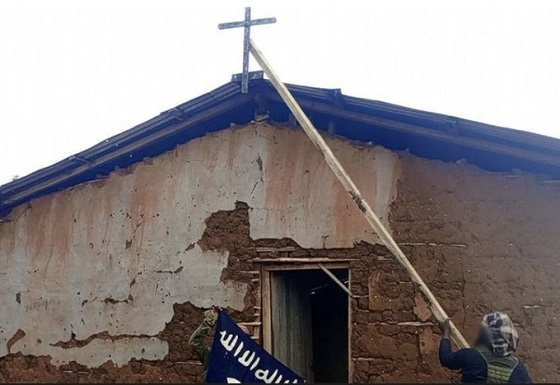International
Jihadis behead 70 Christians in DR Congo church

 MxM News
MxM News
Quick Hit:
Seventy Christians were brutally murdered by jihadists affiliated with ISIS in the Democratic Republic of Congo (DRC). The victims were forced into a Protestant church and beheaded, marking one of the deadliest attacks on Christians in the region.
Key Details:
- The attack occurred on February 13 in the town of Kasanga, where members of the Allied Democratic Forces (ADF), linked to ISIS, rounded up villagers and executed them inside a Protestant church.
- Open Doors UK, a human rights organization, reported that the ADF targeted 70 Christian villages, leaving families too terrified to bury their dead for a week.
- The international community has largely ignored the atrocity, with few public statements condemning the violence, except from Hungary’s State Secretary for the Aid of Persecuted Christians, Tristan Azbej.
Diving Deeper:
Open Doors UK revealed that the massacre took place when the ADF militants surrounded the village of Maybe, forcibly removing residents from their homes. The 70 Christian villagers were herded into an abandoned Protestant church in Kasanga and systematically executed by beheading. The church had been previously deserted due to escalating security threats in the area.
The ADF, an Islamist militant group linked to ISIS, has been responsible for numerous violent attacks across northeastern DRC. Their objective is to overthrow the governments of the DRC and Uganda to establish a caliphate, similar to the one ISIS formed in Syria and Iraq. The group has intensified its activities in the mineral-rich North Kivu province, killing at least 200 people in the past month alone.
The aftermath of the attack has left surviving Christians in fear, prompting many to flee the region. A church elder from CECA-20, the Evangelical Community in Central Africa, expressed despair, stating, “We don’t know what to do or how to pray. We’ve had enough of massacres. May God’s will alone be done.”
Open Doors UK strongly condemned the attack, urging governments and international organizations to prioritize civilian protection in eastern DRC. Despite the magnitude of the atrocity, international media coverage has been minimal. Social media users have criticized the lack of global attention to the incident.
Hungary’s State Secretary for the Aid of Persecuted Christians, Tristan Azbej, was one of the few international figures to respond publicly. He expressed horror at the killings, calling the victims “Christian martyrs” and emphasizing the need for global recognition and action against Christian persecution.
The violence underscores the ongoing security crisis in the DRC, where numerous militant groups, including the ADF, continue to vie for control over the region’s valuable mineral resources. As the humanitarian situation worsens, the international community faces growing pressure to respond to the escalating persecution of Christians in the region.
International
Trump puts new price tag on Canada joining “Golden Dome”

Quick Hit:
President Trump has upped the cost for Canada to join the U.S. “Golden Dome” missile defense program to $71 billion—$10 billion more than his previous ask.
Key Details:
- Trump confirmed the new $71 billion figure while speaking to reporters aboard Air Force One.
- Canada has pushed back, with PM Mark Carney and diplomats calling Trump’s offer a “protection racket.”
- Trump said Canada could access the system for free if it became the 51st U.S. state.
Diving Deeper:
President Trump has put a new and steeper price on Canada’s potential entry into America’s “Golden Dome” missile defense program. Speaking from Air Force One on Monday, Trump told reporters, “They want to be in… Seventy-one billion they’re going to pay.”
That’s a $10 billion increase from the $61 billion figure Trump had previously floated, marking a sharp escalation in his negotiations with Ottawa. The Golden Dome, described by the administration as a “state-of-the-art” defense shield, aims to protect North America from a new era of missile threats—particularly those posed by China, Russia, and North Korea.
Trump has framed the Golden Dome as the long-awaited realization of Ronald Reagan’s “Star Wars” vision, using space-based sensors and interceptors to strike down incoming ballistic, cruise, or hypersonic missiles. Development timelines suggest full deployment is still 5–7 years off, but an initial $25 billion is already allocated in next year’s defense budget. The entire project may run upwards of $175 billion, with some estimates as high as $542 billion over 20 years.
Canada, which has long partnered with the U.S. under NORAD to detect airborne threats, has expressed interest in joining the project. But Trump is demanding a separate, costly buy-in. He reiterated that Ottawa would “have to pay a lot of money” to participate unless it pursued a full political union with the U.S. “It would be free if Canada became the 51st state,” he added.
Canadian leaders have pushed back hard. Prime Minister Mark Carney, re-elected in April after campaigning against U.S. interference, said Canada wants to protect its citizens but not under terms dictated from Washington. Ambassador to the U.N. Bob Rae went further, calling Trump’s offer a “protection racket.”
conflict
Trump dismisses US intelligence that Iran wasn’t pursuing nuclear bomb before Israeli attack

From LifeSiteNews
By Dave DeCamp
When asked about Tulsi Gabbard’s assessment, President Trump said, ‘I don’t care what she said. I think they’re very close to having [a nuclear weapon].’
Ahead of Israel’s attacks on Iran, U.S. intelligence assessed that Iran was not pursuing nuclear weapons and that even if it chose to do so, it would take up to three years for Tehran to be able to produce and deliver a nuclear bomb against a target of its choosing, CNN reported on Tuesday, citing people familiar with the intelligence.
The U.S. assessment goes against the claims from Israeli Prime Minister Benjamin Netanyahu, who launched the war under the pretext of preventing Iran from obtaining a nuclear weapon. But President Trump appears to be taking Israel’s word over his own intelligence agencies, as he told reporters that he didn’t care about his director of national intelligence’s assessment on the issue.
In March, DNI Tulsi Gabbard said that “Iran is not building a nuclear weapon and Supreme Leader Khamenei has not authorized the nuclear weapons program he suspended in 2003.” Her assessment was reflected in the Intelligence Community’s annual threat assessment.
When asked about this assessment, President Trump said, “I don’t care what she said. I think they’re very close to having [a nuclear weapon].”
Netanyahu claimed in an interview on Sunday that he shared intelligence with the U.S. that Iran could have developed a nuclear weapon within months or a year, although that was not the conclusion of U.S. intelligence agencies, based on the CNN report. But even based on Netanyahu’s own timeline, the U.S. would have had time to continue negotiations with Iran.
Israel attacked Iran two days before another round of negotiations between the U.S. and Iran was set to be held. Trump had been demanding that Iran eliminate its nuclear enrichment program, which was a non-starter for Tehran. Despite the apparent impasse, Iran was set to present a counter-proposal to the U.S., but the talks were canceled after Israel launched its war.
Reprinted with permission from Antiwar.com.
-

 Energy2 days ago
Energy2 days agoKananaskis G7 meeting the right setting for U.S. and Canada to reassert energy ties
-

 Business2 days ago
Business2 days agoCarney’s Honeymoon Phase Enters a ‘Make-or-Break’ Week
-

 Alberta2 days ago
Alberta2 days agoAlberta announces citizens will have to pay for their COVID shots
-

 conflict2 days ago
conflict2 days agoIsrael bombs Iranian state TV while live on air
-

 Business2 days ago
Business2 days agoCarney praises Trump’s world ‘leadership’ at G7 meeting in Canada
-

 Business1 day ago
Business1 day agoThe CBC is a government-funded giant no one watches
-

 conflict2 days ago
conflict2 days agoTrump leaves G7 early after urging evacuation of Tehran
-

 conflict1 day ago
conflict1 day agoMiddle East clash sends oil prices soaring






